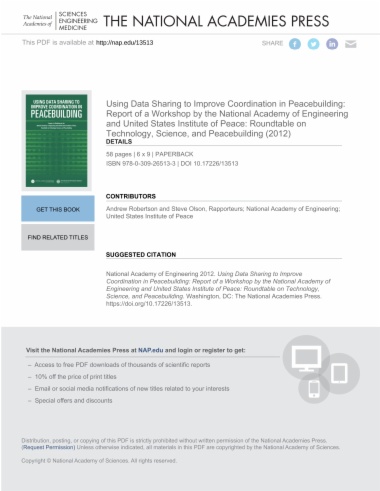

On May 23, 2012, the Roundtable on Technology, Science, and Peacebuilding convened a workshop at the United States Institute of Peace (USIP) to investigate data sharing as a means of improving coordination among US government and nongovernment stakeholders involved in peacebuilding and conflict management activities. Using Data Sharing to Improve Coordination in Peacebuilding:Report of a Workshop by the National Academy of Engineering and the United States Institute of Peace: Roundtable on Technology, Science, and Peacebuilding addresses the following question: What needs must a data sharing system address to create more effective coordination in conflict zones and to promote the participation of federal agencies and nonfederal organizations in Peacebuilding?
In addition, the workshop served as a means to obtain feedback on the UNITY system, a data-sharing platform developed by the Department of Defense (DOD) and the United States Agency for International Development (USAID). The Roundtable was established in 2011 as a partnership between USIP and the National Academy of Engineering (NAE) to make a measurable and positive impact on conflict management, peacebuilding, and security capabilities by bringing together leaders from the technical and peacebuilding communities. Its members are senior executives and experts from leading governmental organizations, universities, corporations, and nongovernmental organizations.
Its principal goals are: 1. To accelerate the application of science and technology to the process of peacebuilding and stabilization; 2. To promote systematic, high-level communication between peacebuilding and technical organizations on the problems faced and the technical capabilities required for successful peacebuilding; and 3. To collaborate in applying new science and technology to the most pressing challenges faced by local and international peacebuilders working in conflict zones. The Roundtable is strongly committed to action-oriented projects, and the long-term goal of each is to demonstrate viability with a successful field trial. The Roundtable has selected a portfolio of high-impact peacebuilding problems on which to focus its efforts: 1. Adapting agricultural extension services to peacebuilding, 2.Using data sharing to improve coordination in peacebuilding, 3. Sensing emerging conflicts, and 4. Harnessing systems methods for delivery of peacebuilding services.